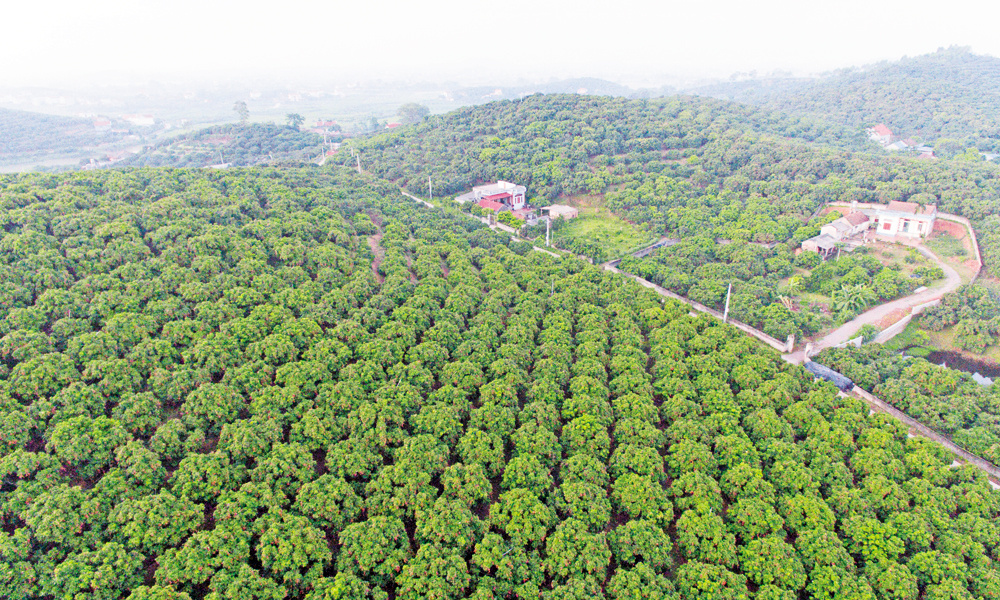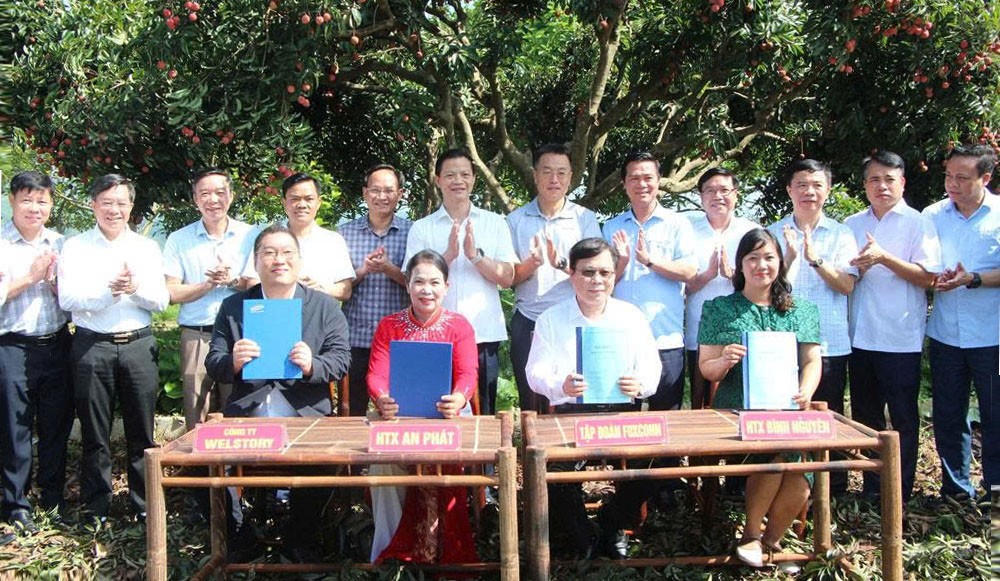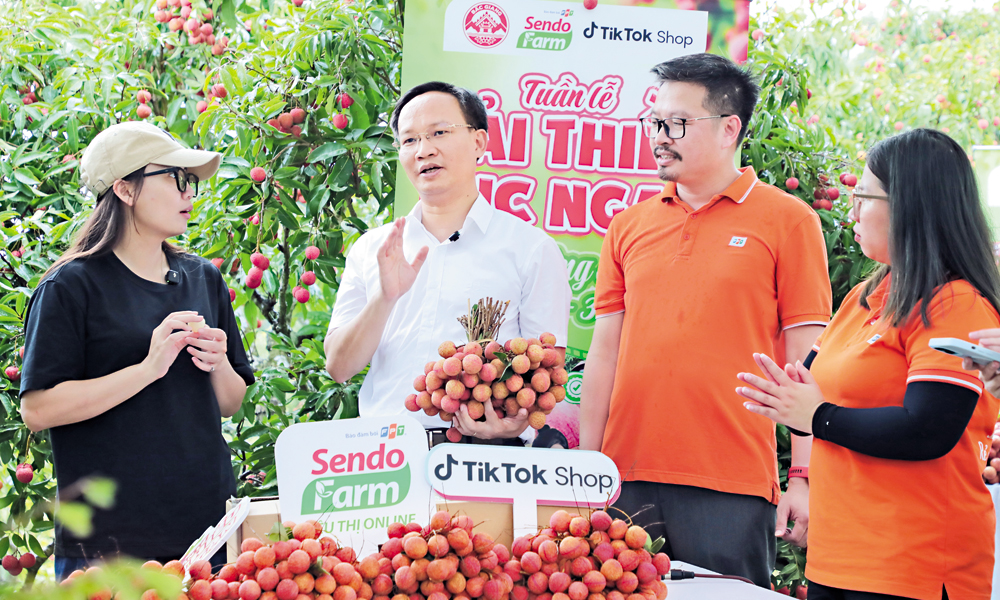Bac Ninh’s steps make difference
BAC NINH – The establishment of large-scale specialized farming zones has transformed the agricultural landscape in Bac Ninh province, not only producing safe and high-quality products but also connecting them with modern distribution channels. To maintain this momentum and ensure long-term sustainability, local authorities are focusing on science and technology as the core driver of innovation and differentiation.
Strong support and strategic policies
In line with central government directives, Bac Ninh has implemented a series of agricultural development programmes tailored to local conditions. These initiatives have been underpinned by strong leadership, inter-sectoral coordination and resolutions focusing on commercialized production aligned with new rural development efforts.
 |
|
Cold-room chicken farming in Tam Tien commune. |
Recent resolutions have emphasized sustainable agriculture through the use of high technology. Bac Ninh has introduced a wide range of support policies, including upgrades to products under OCOP (One Commune, One Product) programme, infrastructure development, on-field transportation, irrigation, mechanization, digital transformation and technology adoption—all aimed at reducing production costs and increasing farmer profits.
New specialized farming zones have emerged across the province, growing crops such as melons in greenhouses and black grapes, while off-season crops like Bao Son pineapples and Luc Nam custard apples have expanded supply chains.
In animal husbandry, technological advances have enabled cold-room chicken farming, artificial insemination, herbal feed and indoor sturgeon farming, all marking progress in Bac Ninh’s agricultural modernization.
Recognizing the critical role of science and technology, the province passed a resolution in 2016 to promote high-tech agriculture. This was followed by a comprehensive restructuring plan (2021–2025), focusing on sustainable development, quality enhancement, value-added production improved competitiveness through value-chain organization.
As a result, over 30% of the province’s agricultural output now comes from high-tech practices. Many of these products meet strict food safety standards and have earned 3- to 5-star OCOP certifications, preparing them for domestic and export markets.
One notable policy that has received strong public support was the rural road reinforcement programme, which led to the construction of more than 4,000 kilometers of hardened roads. This connected villages to commune centers and provincial hubs, significantly improving logistics and agricultural value.
 |
|
OCOP-certified products from Quyen Phong Agricultural Cooperative in Tan Yen commune. |
Despite substantial progress, certain challenges remain. Farming practices have generally shifted toward more technical and efficient models, but overuse of agricultural inputs persists in some areas. Additionally, low-quality products on the market contribute to inefficiencies and crop damage.
Organic and circular farming models are still limited in scale. Authorities are urging farmers to reduce input overuse, adopt balanced fertilization, and protect soil health for more sustainable practices.
Modern, efficient and sustainable outlook in the future
Bac Ninh is positioning itself as a stronghold of both industry and agriculture. With expanding infrastructure and logistics systems, the province is better equipped to support modernized agriculture. Authorities are focusing on reducing production costs, boosting profits, and promoting high-tech, circular, and multi-purpose farming.
To support local lychee and OCOP product producers, National Assembly Vice Chairman Nguyen Duc Hai urged Bac Ninh to improve crop quality and post-harvest technology while building sustainable value chains linking farmers, businesses, scientists, and regulators.
He reaffirmed the NA's commitment to legal reform and policy support to foster science, private sector growth and support for small businesses and cooperatives.
Chairman of the Bac Ninh People’s Committee Vuong Quoc Tuan highlighted plans to establish deep-processing agro-industrial parks and agricultural machinery R&D centers to strengthen innovation and competitiveness. Facing climate change and global integration, the province sees digital transformation and scientific application as essential.
Bac Ninh is also targeting the development of eco-agriculture, urban farming and agritourism, aiming to build premium brands linked to processing and exports.
 |
|
High-tech perilla cultivation model by Ho Guom Agriculture Joint Stock Company in Lam Thao commune. |
Although still early-stage, the integration of high-tech practices has helped reduce chemical input usage, enabling origin traceability and collective branding. Expanding GlobalGAP and VietGAP-certified cultivation further supports sustainable production and environmental protection.
Authorities recognize that relying solely on fresh produce leaves farmers vulnerable to seasonality and preservation challenges.
To boost value, Bac Ninh is strategically planning agro-industrial zones to promote deep processing. These zones will support high-tech raw material cultivation and attract investment from capable enterprises.
Companies will form closed-loop partnerships with farmers to bring Bac Ninh’s agricultural products to global markets—serving not only as exports but also as ambassadors for the province and Vietnam.
 Bắc Ninh
Bắc Ninh









.jpg)



Reader's comments (0)